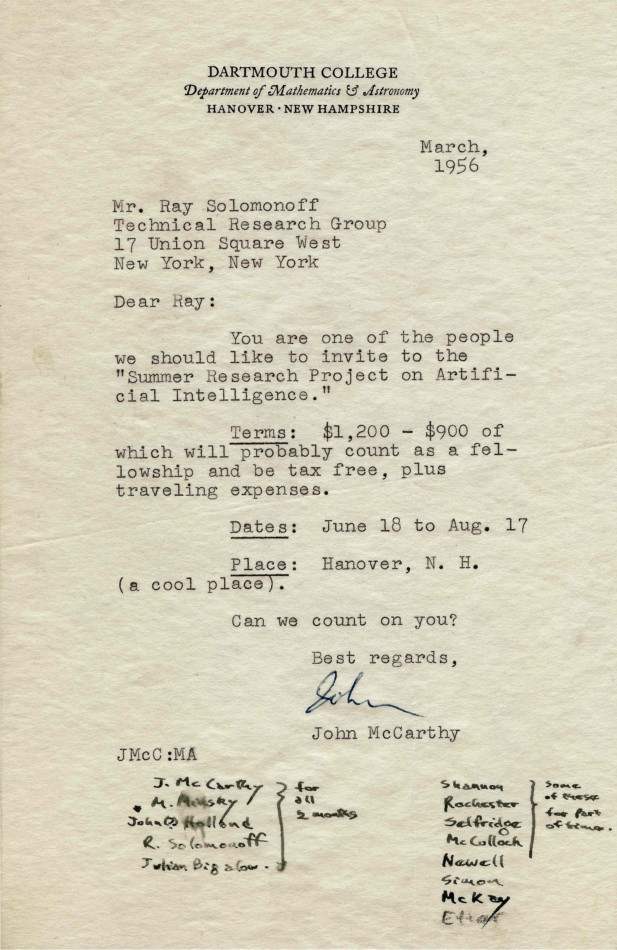The following is a tentative schedule for the course. Please check back regularly for updates as the term progresses.
Thu Jun 20
No class
Fri Jun 21
Lecture: Artificial intelligence: Ideas and their evolution
Keywords: Turing test, Dartmouth workshop, expert systems, strong AI, weak AI, artificial general intelligence (AGI)
Reading material:
- Neapolitan et al. Chapter 1.1 "History of Artificial Intelligence"
(book chapter)
- J. Veisdal: "The Birthplace of AI" (2024) (substack post)
- A. Turing: "Computing Machinery and Intelligence" (1950) §1 "The Imitation Game" (full paper)
Mon Jun 24
Lecture: Knowledge and reason
Keywords: tables, functions, frames, semantic networks, knowledge graphs
Reading material:
- Neapolitan et al. Chapter 4 "Certain Knowledge Representation"
(book chapter)
Wed Jun 26
Lecture: Probabilistic graphical models
Keywords: directed acyclic graphs, Bayesian networks, Markov random fields (MRFs), factor graphs
Reading material:
- Neapolitan et al. Chapter 7 "Uncertain Knowledge Representation"
(book chapter)
Thu Jun 27
Lecture: Inference on probabilistic graphical models
Keywords: conditional probabilities, random variables, Bayes' theorem, message passing / belief propagation
Reading material:
- Wasserman Chapter I.1 "Probability" and Chapter I.2 "Random Variables"
(book)
Fri Jun 28
Lecture: Linear regression
Keywords: linear regression, train-test split, quality of fit, residual sum of squares (RSS), mean squared error (MSE), R squared, ordinary least squares (OLS), Gauss-Markov theorem, collinearity, heteroscedasticity
Reading material:
Mon Jul 1
Lecture: Review of linear algebra
Keywords:vectors, matrices, linear transformations, change of basis, eigenbasis, eigendecomposition, singular value decomposition
Reading material:
- Sanderson (3Blue1Brown) Chapter 3 "Linear Transformations" (video)
- Sanderson (3Blue1Brown) Chapter 7 "Inverse matrices, column space and null space" (video)
- Sanderson (3Blue1Brown) Chapter 13 "Change of basis" (video)
- Sanderson (3Blue1Brown) Chapter 14 "Eigenvectors and eigenvalues" (video)
- Brunton et al. Section 1.3 "Singular Value Decomposition: Mathematical Overview" (video,
book)
Wed Jul 3
Lecture: Regression and classification
Keywords: the bias-variance tradeoff, 1-hot encoding, discriminative models, logistic regression, k-nearest neighbors (KNN), generative models, decision boundary, linear discriminant analysis (LDA), quadratic discriminant analysis (QDA), naive Bayes
Reading material:
Thu Jul 4
No class on Independence Day.
Fri Jul 5
Lecture: Resampling and validation
Keywords: holdout set, validation accuracy, crossvalidation, leave-one-out crossvalidation (LOOCV), bootstrap, data leakage, imputation
Reading material:
Mon Jul 8
Lecture: Feature selection
Keywords: shrinkage, best subset selection, stepwise forward selection, stepwise backward selection
Reading material:
Wed Jul 10
Lecture: Regularization
Keywords: curse of dimensionality, Lp norm, gradient descent, ridge regression, lasso, elastic net, feature engineering, dimension reduction, principal component analysis (PCA), principal component regression (PCR)
Reading material:
Thu Jul 11
Code lab
Fri Jul 12
Lecture: Decision trees
Keywords: regression trees, classification trees, tree ensemble methods, bagging, boosting, random forests, Bayesian additive regression trees (BART)
Reading material:
Mon Jul 15
Lecture: Support vector machines
Keywords: linearly separable patterns, maximum-margin models, hard margin, soft margin, support vector classifier, loss functions for binary classification
Reading material:
Wed Jul 17
Lecture: Function approximation
Keywords:feature mapping, feature augmentations, linear classifiers with non-linear decision boundaries, manifold learning, infinite-dimensional vector spaces, function spaces, random features, Koopman operator
Reading material:
Thu Jul 18
Code lab
Fri Jul 19
Lecture: Kernel methods
Keywords: linear kernels, non-linear kernels, kernel trick, Hilbert spaces, reproducing-kernel Hilbert spaces, representer theorems
Reading material:
Mon Jul 22
Lecture: Introduction to neural networks: Perceptron and beyond
Keywords: perceptron, activation function, ReLU, perceptron learning algorithm, stochastic gradient descent, epoch, mini-batch, momentum, RMSProp, Adam
Reading material:
Wed Jul 24
Lecture: Neural network architectures and neural coding
Keywords: feed-forward neural network, softmax, deep learning, encoder, decoder, convolutional neural networks (CNNs)
Reading material:
o
Thu Jul 25
Code lab
Fri Jul 26
Lecture: Training and regularizing neural networks
Keywords: backpropagation, double descent, drop out, early stopping, regularization
Reading material:
Mon Jul 29
Lecture: Forecasting and prediction
Keywords: Taken's theorem, time-delayed embedding, recurrent neural networks (RNNs), reservoir computing
Reading material:
Wed Jul 31
Lecture: Natural language processing
Keywords: structured prediction, text classification, bag of words, self-supervised learning, word embeddings
Reading material:
Thu Aug 1
Code lab
Fri Aug 2
Lecture: Natural language processing (continued)
Keywords: long-term short-term memory, attention, transformer, generative pre-trained transformers (GPTs)
Reading material:
Mon Aug 5
Project proposals
Wed Aug 7
Lecture: Representation learning
Keywords: latent space, autoencoders, restricted Boltzmann machines (RBMs)
Reading material:
Thu Aug 8
Code lab
Fri Aug 9
Lecture: Clustering
Keywords: k-means clustering, hierarchical clustering
Reading material:
Mon Aug 12
Lecture: The topology of data
Keywords: self-organizing maps (SOMs), competitive learning, topological data analysis (TDA)
Reading material:
Wed Aug 14
Lecture: Matrix completion
Keywords: Low rank matrix completion, high rank matrix completion, link prediction, recommender systems
Reading material:
- Brunton et al. Section 1.5 (video)
Thu Aug 15
Code lab
Fri Aug 16
Lecture: Network analysis
Keywords: centrality measures, community detection, modularity maximization, belief propagation
Reading material:
Mon Aug 19
Final project presentations
Wed Aug 21
Final project presentations
Lecture: Transfer learning
Keywords: teacher-student learning, multitask learning
Reading material:
Lecture: Image generation and more transfer learning
Keywords: general adversarial networks (GANs), contrastive language-image pre-training (CLIP), DALL-E, diffusion
Reading material:
